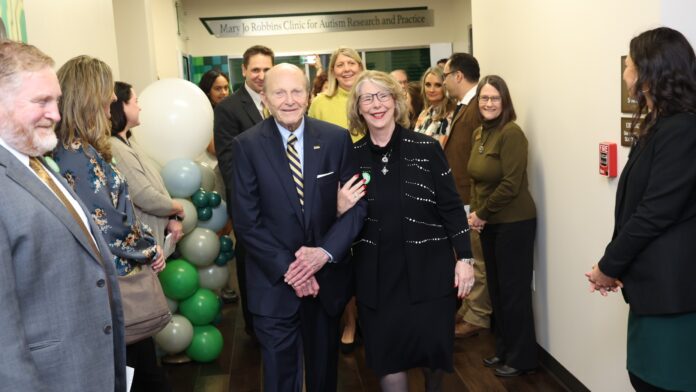
By Raylee Foster | Staff Writer
Baylor is dedicating the Mary Jo Robbins Clinic toward Autism Research and Practice, which is a part of the $2.5 million expansion project within the university’s Speech-Language and Hearing Clinic. The new clinic is currently working with 26 others and expects to accommodate more after hiring new clinical faculty.
Bill and Mary Jo Robbins have had a relationship with Baylor’s science and research programs since at least 2014 when the College of Health and Human Sciences was renamed the Robbins College.
Clinical coordinator Deborah Rainer said the Robbins’ have a special interest in autism research, and wanted to contribute to it.
“We do know that they have a special interest in autism and they wanted to do this for us,” Rainer said. “We’re in the Robbin’s College and I think due to their special interest in that, they felt we were a good fit for [the donation].”
The clinic involves both research and practice, with new changes targeted toward growth in its practical use. Located on the second floor of Cashion Academic Center, the clinic includes sensory focused spaces, feeding areas, labs and classrooms.
Rainer said the new facilities include toddler and preschool classrooms, a motor sensory room, areas for social thinking, language literacy labs for students, an expanded feeding area and interprofessional spaces.
Prior to the dedication, the clinic worked individually with roughly 26 clients, and this amount has stayed consistent since the dedication. Due to a lack of clinical faculty members, the clinic’s ability to accommodate more people is limited. Though graduate students are doing most of the work within the clinic, they cannot work without supervision.
“Our graduate students actually do all of the treatment, they do all of the evaluations, however, due to our accrediting board, they have to have someone that is certified by our accrediting board as well as licensed in the state of Texas,” Rainer said.
Clinical faculty member and director Kristle Soto said she supervises students working in the preschool classroom in the clinic and its design is intentionally similar to that of a typical classroom.
Soto said the work done with children involves two hours of activities four days a week, which looks different for each child based on their specific needs. They work on social and individual tasks, sensory experiences and exposure to different foods.
“We also go to our motor sensory lab, which is an amazing room and is a place we use if there is an emotional disregulation or a student is struggling with transitioning … to the next activity,” Soto said. “They can take a break in that room and decompress.”
Soto also said the children they work with are not long term and will eventually transition out of their clinical program. Some students are involved in other learning programs, like public school, in addition to the clinic.
“The preschool is for children ages three to six, so once they’re six they would need to go to a different clinic or move on to their public school — a lot of the kids we see actually go to public school for half the day, and then they’ll come to us the other portion of the day,” Soto said.
Rainer said to be admitted into the program, the individual needs a referral, which can include a self referral. The child will then undergo an evaluation and be placed in treatment, which are done by graduate students in the clinic.
The criteria for admission to the clinic includes being between the ages of 18 months and six years old as well as having a diagnosis or indications of Autism Spectrum Disorder, according to their website. While there is currently a waitlist for both evaluations and treatment, the clinic is available for contact regarding treatment plans.





